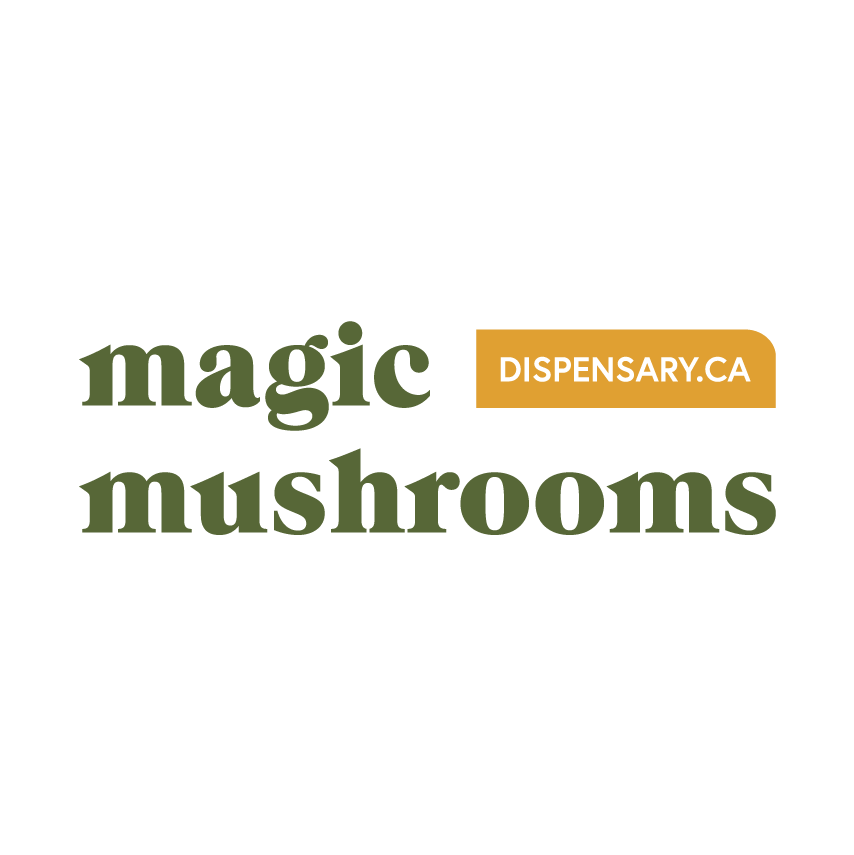The decision to choose between THC and Psilocybin, or to compare THC with Psilocybin, fundamentally boils down to one’s personal preferences and specific requirements. THC, known as the main psychoactive ingredient in cannabis, is celebrated for its ability to produce feelings of relaxation and joy and may also provide pain relief benefits. On the other hand, psilocybin, found predominantly in certain fungi, affects serotonin receptors leading to changes in mood and perception. This compound is increasingly being acknowledged for its potential benefits in the realm of mental health therapy. Each of these substances offers distinct effects, advantages, and possible risks. It’s vital to consider your mental, emotional, and physical wellbeing when making a choice. Exploring this detailed guide further could help illuminate whether THC or Psilocybin suits your personal medicinal or leisurely needs best.
Key Takeaways
- THC and psilocybin interact differently with the brain, impacting the endocannabinoid and serotonin systems, respectively.
- THC is known for inducing euphoria and relaxation, while psilocybin can lead to profound shifts in perception and mood.
- Consumption methods and effects differ, with THC commonly smoked or ingested and psilocybin typically consumed via mushrooms.
- THC has recognized therapeutic benefits in pain management and appetite stimulation, while psilocybin shows potential in treating mental health conditions.
- Individual preferences, needs, and tolerances should be considered when deciding between THC and psilocybin.
Understanding THC vs Psilocybin
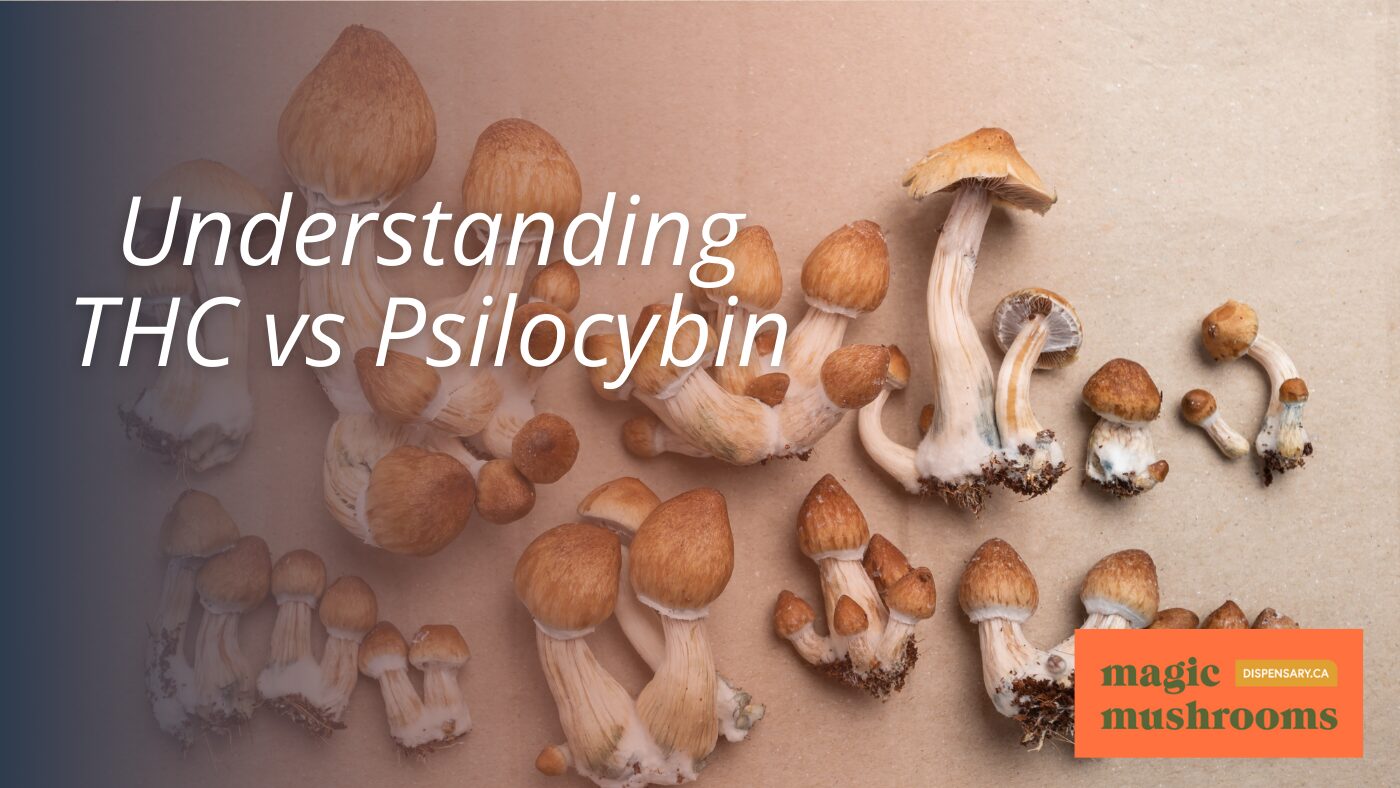
Exploring the intricacies of THC and psilocybin, it is crucial to grasp that while both are psychoactive compounds, they interact with the brain in distinct ways and are utilized for different purposes. THC, derived from cannabis, primarily influences the endocannabinoid system, causing euphoria and altered perceptions. Conversely, psilocybin, found in magic mushrooms, interacts with serotonin receptors, inducing hallucinations and mood alterations.
The usage of these substances diverges significantly. THC is frequently employed for recreational purposes, offering relaxation and pain management benefits. It has been legalized in various jurisdictions and is readily accessible in multiple forms, from edibles to oils. Conversely, psilocybin, while historically used in spiritual and cultural practices, is now garnering considerable attention in the medical community. Its potential therapeutic benefits in treating mental health conditions like depression and anxiety are under rigorous investigation.
The experiences elicited by THC and psilocybin vary remarkably. Users of THC might expect euphoria, relaxation, heightened sensory experiences, and altered time perception. Psilocybin, on the other hand, can induce profound changes in perception, mood, and thought, often described as a ‘trip.’ These experiences are highly subjective and can range from enlightening to disconcerting.
Basics of THC
Shifting our focus to THC, this active compound in cannabis is renowned for its psychoactive effects. It is the principal psychoactive substance found in the cannabis plant, and its impact on the human mind and body has been studied extensively. It mimics the effects of anandamide, a neurotransmitter produced naturally by the body to regulate sleeping and eating habits and perceptions of pain.
THC accomplishes its effects by binding to cannabinoid receptors in the brain, primarily the CB1 receptor. This interaction leads to a series of reactions within the brain that culminate in the euphoria or ‘high’ that users report. It can lead to altered perceptions, including an enhanced sense of taste and smell, a distorted sense of time, and increased appetite.
The consumption of THC is commonly achieved through a variety of methods like smoking, vaping, ingesting edibles, or applying topicals. The consumption process can significantly influence the onset, intensity, and duration of its effects. For instance, when smoked or vaped, the effects can be felt within minutes, while edibles may take one to two hours to kick in.
Lastly, remember that the potency of THC can vary significantly among different cannabis strains and products. The higher the concentration, the more potent the effects. Understanding the basics of THC and its effects can help individuals make informed decisions about its use, aligning with their quest for liberation and personal wellness.
Fundamentals of Psilocybin
Delving into the world of psilocybin, we find a naturally occurring psychedelic compound present in certain types of mushrooms, particularly psilocybin mushrooms. This compound has been harnessed for centuries across various cultures for spiritual and therapeutic applications, underlining its time-tested relevance.
Psilocybin interacts with serotonin receptors in the brain, which leads to alterations in perception, mood, and cognition. These changes manifest in myriad ways, such as visual and auditory hallucinations, an altered sense of time, and profound reflective experiences. While these effects may be intense, they offer a unique pathway to self-discovery and personal growth, fostering a deep connection to the self and the world.
Emerging research suggests that psilocybin may also have therapeutic benefits, particularly for mental health conditions like depression, anxiety, and post-traumatic stress disorder (PTSD). This potential stems from psilocybin’s ability to induce transformative psychological experiences, which may help to reframe negative thought patterns and promote emotional healing.
However, as with any potent mind-altering substance, psilocybin must be approached respectfully and cautiously. To ensure safe and beneficial use, seeking guidance from healthcare professionals and staying informed about the latest research is recommended.
THC: Origin and History
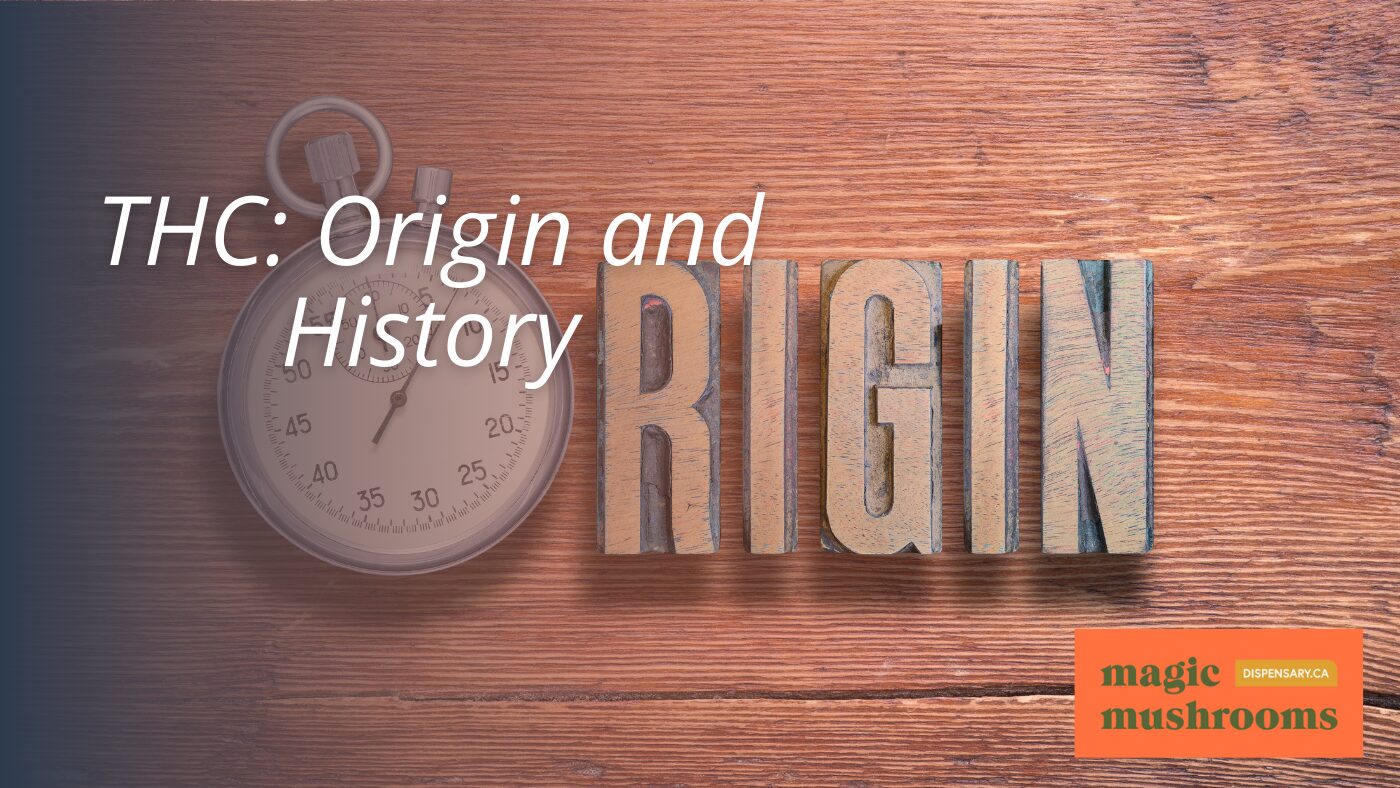
In contrast to psilocybin, THC, or tetrahydrocannabinol, is a psychoactive compound found in cannabis, known for inducing the characteristic ‘high’ sensation. THC’s recognition in the scientific community started in the 1960s. Its discovery was a pivotal moment in cannabis research, as it revealed the compound responsible for the psychoactive effects of cannabis consumption.
THC interacts with the human body through the endocannabinoid system, a complex cell-signaling system. It binds to the cannabinoid receptors prevalent in the brain and nervous system, altering the user’s normal functioning and perceptions. The effects experienced from THC are influenced by various factors such as dosage, the method of consumption, and the individual’s tolerance levels.
Historically, THC has been used for both medicinal and recreational purposes. Its analgesic and relaxing properties have made it a popular choice for pain management, while its psychoactive effects have been sought after for recreational use. As a reflection of its medicinal potential, THC is an active ingredient in FDA-approved drugs like Marinol and Cesamet, which are used to treat nausea and stimulate appetite in patients undergoing chemotherapy.
However, the history of THC is also fraught with controversy due to its psychoactive properties and potential for misuse. Therefore, its legal status has fluctuated over the years, and it remains a Schedule I substance under federal law in the United States. Despite this, ongoing research continues to explore the therapeutic benefits of THC, broadening our understanding of this complex compound.
Psilocybin: Origin and History
Psilocybin, a naturally occurring psychedelic compound, is primarily found in certain types of mushrooms, such as Psilocybe cubensis, and has a rich history that spans several centuries. Indigenous cultures across the globe have utilized these mushrooms for their mind-altering effects in spiritual and healing rituals, profoundly integrating them into their societal and religious fabrics.
In the mid-20th century, psilocybin gained popularity in the Western world, particularly during the counterculture movement of the 1950s and 1960s. Academics, artists, and free thinkers exploring and celebrating its psychoactive properties sought to push the boundaries of human consciousness and experience. However, restrictive drug laws enacted in subsequent years placed psilocybin in a legal grey area, stifling further exploration and research into its potential benefits.
Despite this, in recent years, psilocybin has experienced a resurgence, emerging from the shadows of prohibition and into the spotlight of scientific inquiry. Contemporary research has shown that psilocybin has potential therapeutic benefits for mental health conditions, including depression, anxiety, and PTSD, renewing interest in its potential for medicinal use.
Currently, psilocybin is being studied in clinical trials for its potential to induce mystical experiences and promote emotional wellbeing. These studies hold promise for those seeking liberation from traditional, often ineffective, psychiatric treatments. As our understanding of psilocybin expands, so does our potential to harness its transformative power for individual and collective healing. Understanding psilocybin’s origins and history is fundamental to this journey of exploration and discovery.
Chemical Composition of THC
Understanding the chemical composition of THC, or tetrahydrocannabinol, is essential to grasp its psychoactive properties and potential therapeutic benefits fully. THC is the primary psychoactive component in cannabis, responsible for the characteristic ‘high’ sensation. Its chemical formula, C21H30O2, underscores its complex structure, resulting from the unique arrangement of 21 carbon atoms, 30 hydrogen atoms, and two oxygen atoms.
THC primarily interacts with the body’s endocannabinoid system, specifically binding to cannabinoid receptors in the brain and nervous system. This binding process triggers a cascade of neurochemical activities that lead to various effects, including relaxation, euphoria, altered sensory perception, and increased appetite.
The potency of THC in cannabis products can vary significantly. Some strains contain higher levels of THC than others, leading to more pronounced effects and potentially increased therapeutic benefits. This variability is primarily due to environmental factors and cultivation practices, which can significantly influence the THC content in different cannabis plants.
Research continues to explore the potential therapeutic applications of THC. Initial findings suggest that it may offer benefits in managing pain, reducing nausea, and even mitigating specific symptoms in conditions like multiple sclerosis and glaucoma. However, it’s essential to consult healthcare professionals and stay abreast of the latest research to make informed decisions about THC use.
The chemical composition of THC is just one factor in its overall effects and potential therapeutic benefits. Other factors, including individual tolerance, method of consumption, and the presence of other cannabinoids, also play crucial roles.
Chemical Composition of Psilocybin
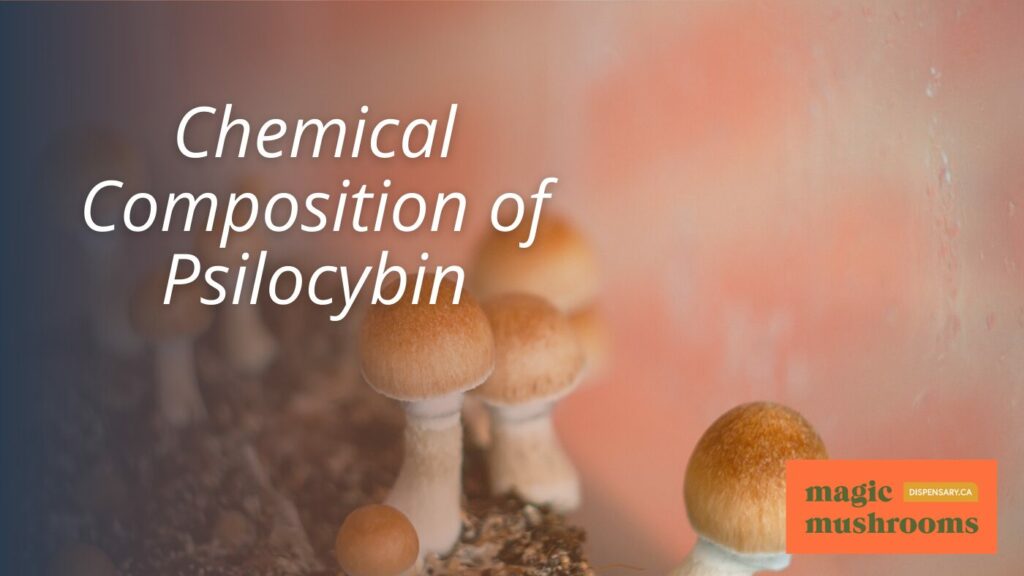
Switching our focus from THC, let’s turn our attention to psilocybin, a naturally occurring psychedelic compound found in certain species of mushrooms. This compound is vital in its chemical composition, which, when ingested, interacts with our brain’s serotonin receptors, resulting in distinct perceptual changes.
Psilocybin is a prodrug, which fundamentally means it is inactive until the body metabolizes it. Once ingested, it is converted into psilocin, another psychedelic compound. This conversion is an integral part of the process, as psilocin is the substance that interacts with our brain, leading to the hallucinogenic effects commonly associated with ‘magic mushrooms.’
The chemical structure of psilocybin and its resultant psilocin is intriguingly similar to that of serotonin. This neurotransmitter plays a crucial role in mood regulation and subjective wellbeing. This similarity allows psilocin to bind to serotonin receptors, particularly the 5-HT2A subtype, which is believed to be primarily responsible for the compound’s psychedelic effects.
The interaction of psilocybin and serotonin receptors leads to changes in perception, cognition, and mood, often described as a ‘trip.’ These effects can be profound and are the subject of ongoing research into the potential therapeutic applications of psilocybin.
While exploring psilocybin as a substance is not exhaustive, it is clear that its chemical composition and the way it interacts with our brain chemistry are distinct. As we continue to explore its potential benefits and risks, understanding this composition is a fundamental step in the journey toward informed use and potential liberation.
How THC Works in the Body
Delving into the workings of THC, or tetrahydrocannabinol, reveals it as the primary psychoactive compound in cannabis that interacts with the brain’s endocannabinoid system. The endocannabinoid system is a complex cell-signaling system that regulates various functions and processes, including mood, memory, and pain sensation. When THC enters the body, it binds to specific receptors (CB1 and CB2) in this system, triggering a series of biochemical interactions that lead to its various effects.
THC’s effects can be diverse upon consumption, manifesting as euphoria, relaxation, heightened appetite, and altered sensory perception. These effects can be highly subjective and are influenced by variables such as dosage, the method of consumption (whether by smoking, ingesting edibles, or vaping), and individual tolerance levels. For some, the experience is calming and enjoyable, while for others, it may induce anxiety or discomfort. Understanding these potential reactions is crucial for using THC responsibly.
In addition to its recreational use, THC has been recognized for its potential therapeutic benefits. Research indicates that it may alleviate symptoms of conditions like chronic pain, nausea, and muscle spasticity. As our understanding of THC continues to grow, so too does its potential for therapeutic application. However, like any substance, THC should be used with caution and under the guidance of a healthcare professional to promote the best possible outcomes. As we seek liberation through understanding, embracing the potential of THC requires informed, conscious decision-making.
How Psilocybin Works in the Body
Venturing into the domain of psilocybin, the active compound found in magic mushrooms transforms the body to psilocin, which then binds to serotonin receptors in the brain. This binding triggers a cascade of neurochemical activities that lead to the unique psychedelic experience associated with psilocybin.
The psilocin-serotonin interaction alters perception and mood changes and enhances introspection. This is due to the structural similarity of psilocin to serotonin, a neurotransmitter responsible for several critical functions such as mood regulation, cognition, and perception. Therefore, ingesting psilocybin can lead to a temporary yet profound shift in the psyche, often described as mind-expanding and illuminating.
The duration and intensity of the psilocybin experience can vary significantly. Factors such as dosage, individual physiology, mindset, and the environment – called ‘set and setting’ – can influence the journey’s trajectory. It is essential to approach it respectfully and cautiously, understanding that this is not simply recreational but often a profound, reflective encounter.
Emerging research suggests that psilocybin may promote neuroplasticity – the brain’s ability to form and reorganize synaptic connections. This has noteworthy implications for mental health, as psilocybin shows promise in alleviating symptoms of depression, anxiety, and PTSD. However, it’s vital to note that these are early days in psilocybin research, and while the future is promising, the journey to fully understand and harness its potential is just beginning. Anyone considering psilocybin should do so in consultation with healthcare professionals, encouraging a liberated yet informed approach to its use.
Common Effects of THC
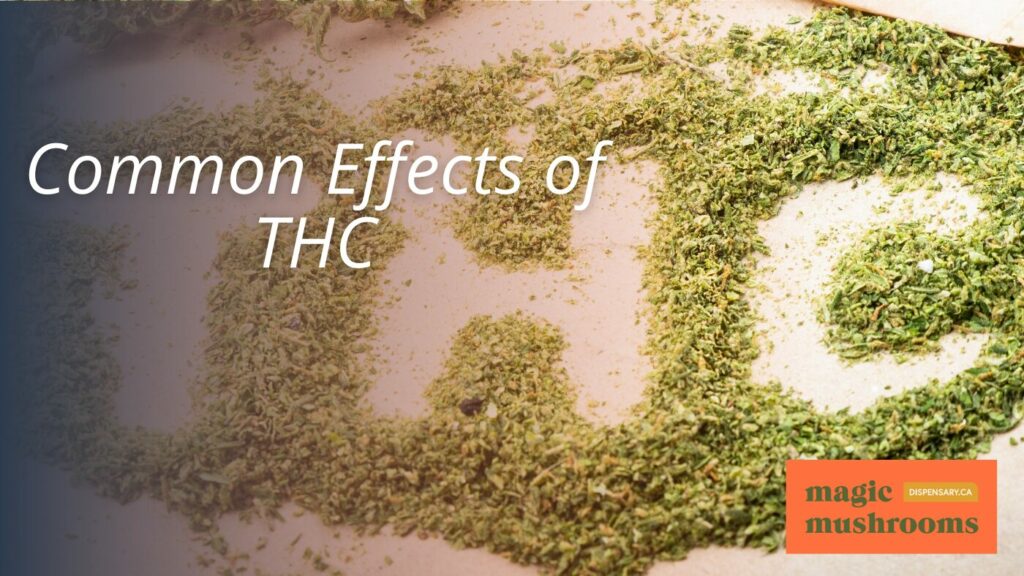
While the effects of psilocybin are intriguing, it’s equally important to understand the impacts of THC, the primary psychoactive compound in cannabis. THC is renowned for inducing euphoria, relaxation, and altered sensory perception. The substance interacts with the endocannabinoid system in the brain, a response that leads to its psychoactive effects.
Commonly reported effects of THC include an increase in appetite, dry mouth, redness of the eyes, and occasionally impaired coordination. These effects can benefit those seeking relief from conditions such as chronic pain, insomnia, and lack of appetite or those simply desiring a state of relaxation.
However, being aware of the less desirable effects is also essential. THC can cause short-term memory impairment and an increased heart rate. Sensory perception can sometimes become heightened to an uncomfortable level for the user. The extent of these effects will vary significantly based on the dosage consumed, the method of consumption, the individual’s tolerance to THC, and the specific strain of cannabis used.
Despite these potential drawbacks, many find the benefits of THC to outweigh the negatives. It’s a highly personal choice and one that should be made with the fullest possible understanding of THC’s effects. This understanding allows for liberation in selection and use. For those considering THC, it is advised to consult with healthcare professionals and stay informed on the latest research to guarantee safe and responsible use.
Common Effects of Psilocybin
Shifting our attention from THC, let’s now shift our focus to psilocybin, the psychoactive compound found in certain types of mushrooms, and its effects on the human body and mind. This naturally occurring psychedelic substance is renowned for its capacity to alter sensory perception, often manifesting in visual distortions, enhanced colors, and synesthesia, a fascinating phenomenon where the senses intertwine.
The effects of psilocybin are not restricted to sensory alterations. Users often report profound psychological and emotional experiences. Feelings of euphoria, deep introspection, and perceived spiritual encounters are common. These experiences can lead to enhanced creativity and novel perspectives, often described as a ‘rebirth’ or ‘awakening.’ This capacity to disrupt entrenched thought patterns and offer fresh outlooks on life and the world is one of the reasons psilocybin is gaining attention in mental health research.
However, like any psychoactive substance, psilocybin is not without its risks. The same intensity of experience that can lead to euphoria and insight can also produce anxiety, fear, and discomfort – the infamous ‘bad trip.’ Physical effects such as muscle twitching and changes in time perception might also occur.
Understanding these effects is vital for anyone considering psilocybin use. This isn’t about promoting or discouraging its use but providing information to empower personal choice. Psilocybin, like THC, presents a unique set of effects and potential risks – understanding these is the first step towards making an informed decision about its use.
Medical Benefits of THC
Having explored the effects of psilocybin, we now turn our attention to the medical benefits of THC, the primary psychoactive compound in cannabis. THC has garnered significant attention in the medical community for its potential therapeutic properties. It interacts directly with the body’s endocannabinoid system, a network of receptors that play an essential role in maintaining homeostasis in the body.
One of the most recognized benefits of THC is its ability to alleviate pain, making it a popular choice for individuals suffering from chronic conditions. For instance, patients with multiple sclerosis often experience muscle spasticity, and THC has been proven effective in managing this symptom.
Moreover, THC has been a lifeline for many cancer patients undergoing chemotherapy. It helps to stimulate appetite and reduce the nausea and vomiting frequently induced by these treatments, improving quality of life during a challenging time.
Mental health is another area where THC shows promise. Research indicates its potential in managing symptoms of conditions like PTSD, providing some patients with a liberating sense of relief.
There’s also emerging evidence that THC may have neuroprotective properties, suggesting it could be beneficial in the treatment of neurodegenerative diseases like Alzheimer’s and Parkinson’s. This is an exciting frontier in cannabinoid research, and as our understanding of THC’s therapeutic potential deepens, it continues to reshape the landscape of modern medicine.
In the end, the decision between THC and psilocybin will depend on individual needs, preferences, and medical advice. As more research unfolds, the hope is to help individuals navigate this complex decision with confidence and clarity.
Medical Benefits of Psilocybin
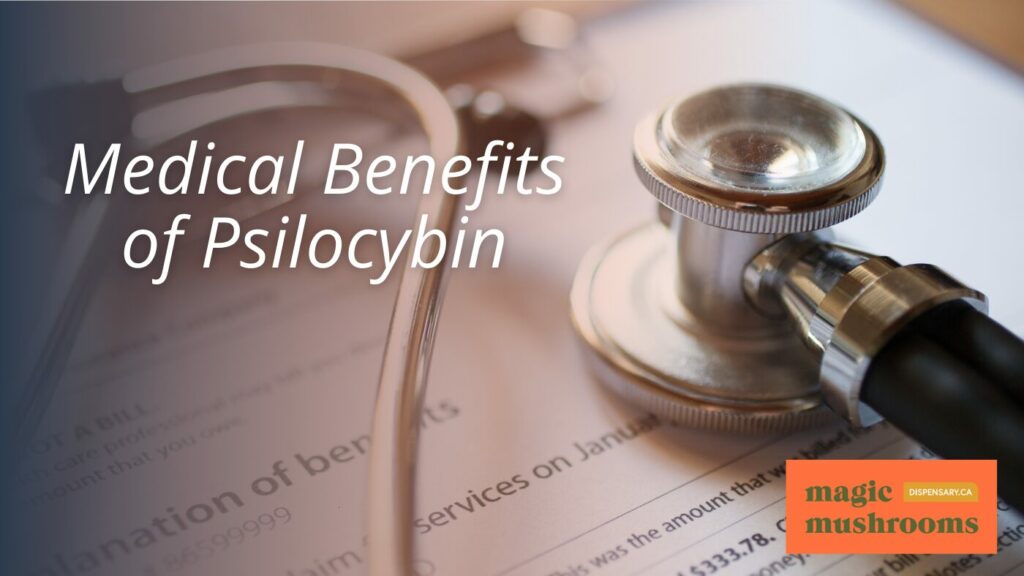
What about the therapeutic potentials of psilocybin, the active compound found in psychedelic mushrooms? Psilocybin is showing strong promise in the domain of mental health. It is being increasingly recognized for its potential in treating depression, anxiety, and post-traumatic stress disorder (PTSD) through its psychedelic effects. The potential benefit of psilocybin therapy extends beyond the temporary alleviation of symptoms. Research suggests that it can provide long-lasting relief for individuals suffering from treatment-resistant depression, even after a single dose.
Furthermore, psilocybin therapy has been linked to increased emotional openness, reduced fear of death, and an overall improvement in wellbeing. These unique therapeutic effects can help patients confront deep-seated emotional issues, facilitating profound psychological healing. This is particularly relevant for those in search of liberation from ingrained patterns of thinking or feeling that may be contributing to their mental health struggles.
In addition to its potential in treating mental health conditions, psilocybin has also demonstrated promising results in addiction therapy. Studies have shown its potential in reducing cravings and promoting abstinence from addictive substances such as tobacco and alcohol. This opens up new opportunities for those seeking liberation from the chains of addiction.
Psilocybin-assisted therapy is emerging as a novel approach to mental health treatment. It offers new possibilities for addressing an array of psychological disorders, providing a potential pathway to liberation for many. In the quest for personal freedom, psilocybin may be a powerful ally.
Potential Risks of THC
Additionally, it’s crucial to ponder its potential risks, especially regarding overconsumption and chronic use. THC, the psychoactive compound found in cannabis, can lead to temporary cognitive impairment, memory issues, and impaired motor skills when consumed excessively. These symptoms typically occur immediately after ingestion and can persist for several hours, affecting an individual’s daily activities and overall quality of life.
Chronic use of THC has been associated with respiratory issues, including bronchitis and lung irritation. This is mainly due to the inhalation of smoke, which can be detrimental to lung health over long periods. Furthermore, the high potency of THC in products like concentrates and edibles might increase the risk of adverse effects and overdose. In particular, these products can deliver substantially higher levels of THC than traditional smoking methods, leading to more pronounced and potentially harmful effects.
Adolescents who frequently use THC may experience negative impacts on brain development and cognitive function. This age group is particularly vulnerable, as their brains are still developing, and exposure to THC can potentially disrupt this process. In addition, mixing THC with other substances, especially alcohol can intensify intoxication and pose additional health risks. The interaction between these substances can amplify their effects, increasing the likelihood of adverse reactions.
Potential Risks of Psilocybin
Psilocybin, the psychoactive compound in magic mushrooms, also carries its own set of potential risks that range from psychological distress to physical discomfort. Proceeding with caution and awareness is crucial, particularly for those seeking liberation through its usage.
Ingesting psilocybin can yield a range of experiences, some positive, others not as much. While it can provide profound insights and novel perspectives, it can also induce anxiety and paranoia, potentially triggering a sense of fear and unease. This is particularly true in uncontrolled environments or when consumed in large doses, leading to what is colloquially referred to as a ‘bad trip.’
Physical side effects can also occur, including muscle twitching, which can be disconcerting for some users. Additionally, the altered perception of time and heightened emotional sensitivity, although often desired effects, can be disorienting and distressing if unexpected or misunderstood.
Even after the immediate effects have worn off, psilocybin can have lingering impacts. In some cases, users may experience flashbacks or persisting perception disorders, where they re-experience the hallucinations even when not under the influence of the substance.
Lastly, it’s crucial to recognize that psilocybin can potentially induce panic attacks or psychotic episodes in vulnerable individuals. Therefore, its usage should be cautiously approached, ideally under a knowledgeable professional’s guidance in a controlled setting.
In your quest for liberation and self-discovery, it is vital to weigh these risks against the potential benefits and make an informed decision that prioritizes your mental and physical wellbeing.
Legal Status of THC
Shifting focus from the potential risks of psilocybin, it’s essential to ponder the legal implications surrounding THC, the psychoactive component in cannabis. THC’s legal status is a mosaic of evolving regulations across different jurisdictions. Its status is somewhat complicated in the United States, where it forms a part of the Schedule I substances under federal law. This classification implies that the federal government considers THC to have a high potential for abuse and no currently accepted medical use.
However, this federal ruling is in stark contrast with the laws of many states that have recognized the potential therapeutic and recreational use of THC, thereby legalizing it. This divergence creates a complex legal landscape for users and suppliers alike. One must be cautious and aware of both the state and federal laws concerning THC to avoid legal complications.
Outside the United States, the legal status of THC varies widely. Some countries have embraced its therapeutic potential and have relaxed laws controlling its use, while others maintain strict prohibitions. The lack of international consensus on the issue further complicates matters for those seeking to use THC, especially across borders.
Moreover, the Schedule I classification of THC has inhibited many scientific studies that could potentially explore its therapeutic benefits. This lack of extensive research leaves many questions surrounding THC unanswered, causing further confusion for potential users. Ultimately, while THC’s legal status is in flux, being knowledgeable about its current standing in one’s jurisdiction is essential.
Legal Status of Psilocybin
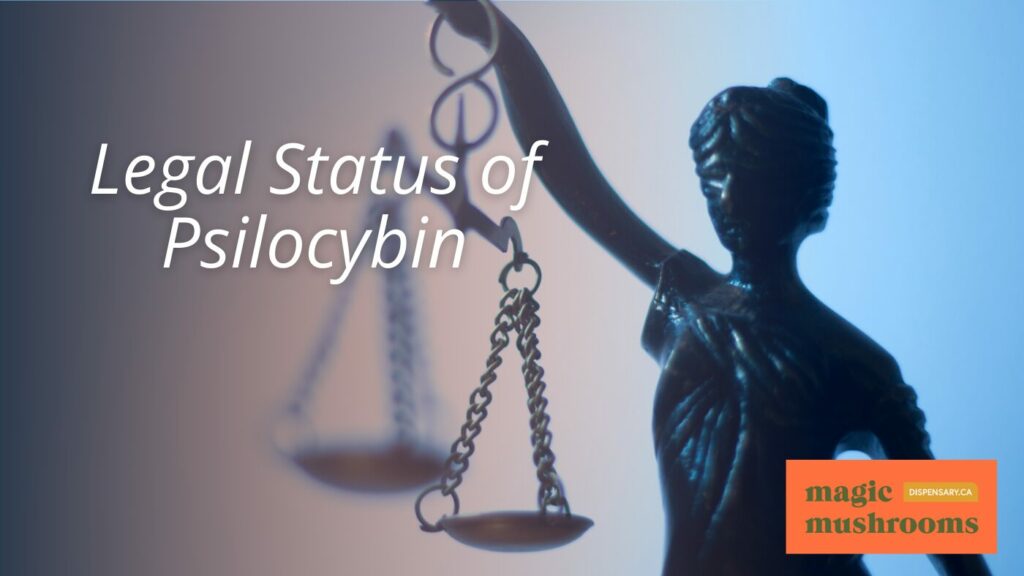
Understanding the legal landscape of psilocybin, the active compound in magic mushrooms can be a complex endeavor, given its classification as a Schedule I substance by the U.S. Drug Enforcement Agency. This designation implies that psilocybin is deemed to have a high potential for abuse, lacks a currently accepted medical use, and absence of accepted safety standards for use under medical supervision. Consequently, possession and distribution of psilocybin-containing mushrooms are illegal at the federal level in the United States.
Nevertheless, the legal status of psilocybin is not universally uniform. While it remains illegal for recreational and medical uses in most countries around the world, there are emerging shifts in policy and public sentiment towards the substance. In recent years, several U.S. cities and states have adopted measures to decriminalize psilocybin, signaling a change in societal attitudes towards this psychoactive substance.
These efforts are primarily driven by growing research interest in the potential therapeutic applications of psilocybin for mental health conditions, including depression, anxiety, and post-traumatic stress disorder. However, the Schedule I status continues to pose significant barriers to research, impeding the progress of scientific understanding and medical applications of psilocybin.
Recreational Use of THC
When it comes to the recreational use of THC, the psychoactive compound in cannabis, it is essential to take into account its varied effects, which can range from euphoria and relaxation to short-term memory impairment and increased heart rate. While these effects can be enjoyable for some, they can also present challenges for others, particularly regarding mental and physical functioning.
The recreational use of THC can be an enjoyable social activity for many. Some users feel more creative, social, and aware of their sensory experiences. THC can enhance music, food, and other sensory experiences when used moderately, making it a popular choice for social gatherings and creative endeavors.
However, the effects of THC can vary widely depending on a variety of factors, including the strain of cannabis, the dosage, and the individual’s tolerance level. Some people may experience anxiety or paranoia, particularly with higher doses or with certain strains of cannabis. There can also be adverse physical effects, such as an increased heart rate, dry mouth, and impaired motor coordination.
It’s also important to be aware of the legal implications of recreational THC use. While cannabis has been legalized in many areas, there are still regions where its use is illegal and can lead to significant legal consequences. So, always stay informed and respect the laws of your region.
Recreational Use of Psilocybin
Exploring the domain of psilocybin, the psychoactive compound found in magic mushrooms, one can expect a range of effects, from euphoria and altered sensory perception to enhanced creativity during recreational use. Psilocybin, revered by many for its potential to trigger profound spiritual experiences and insights, also has a reputation for increasing emotional sensitivity.
During a psilocybin session, users often report experiencing visual distortions, a phenomenon where time seems to slow down, and synesthesia, a blending of the senses where one might ‘see’ sounds or ‘hear’ colors. These experiences can be transformative, opening doors to novel thoughts and perspectives.
Of course, it’s crucial to remember that these effects can be intense, lasting between 4 and 6 hours. This duration can significantly impact the user’s mood, cognition, and perception, often leading to introspection or an enhanced appreciation of one’s surroundings.
However, like any mind-altering substance, psilocybin comes with its potential risks. Some users may experience anxiety or paranoia, mainly if they consume too much or are in an uncomfortable environment. Additionally, there is the possibility of challenging experiences known as ‘bad trips,’ which can be distressing but are typically temporary.
Microdosing: THC Vs Psilocybin
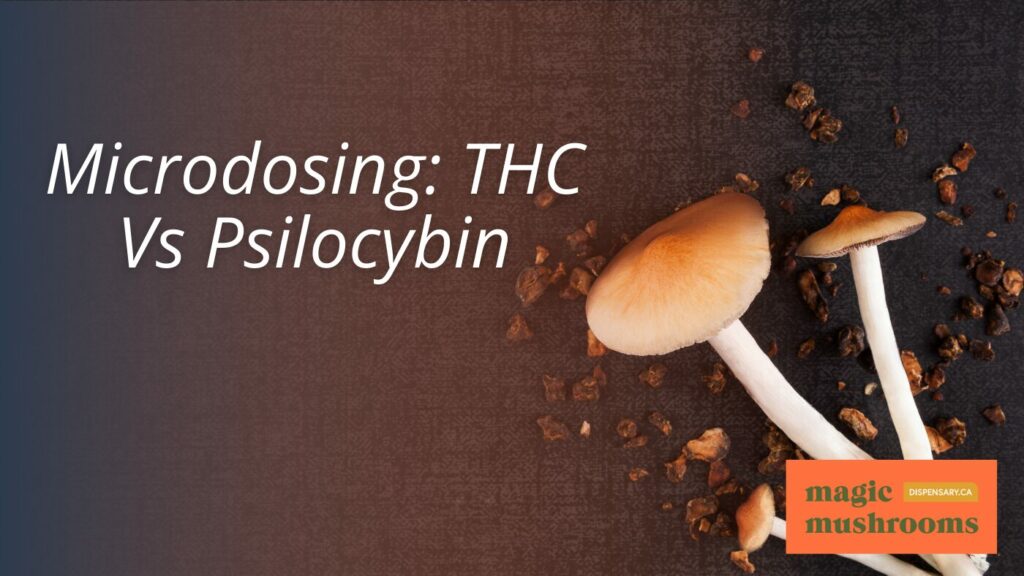
While the recreational use of psilocybin can provide a profound and potentially transformative experience, it’s worth noting another approach to ingesting both this compound and THC – microdosing. This method involves consuming small, controlled quantities of these substances, aiming to reap the benefits without a full-blown psychedelic experience.
Microdosing THC, the active component of cannabis, allows users to experience subtle enhancements such as improved mood, reduced anxiety and boosted creativity without feeling intoxicated. Those seeking a gentle, manageable influence on their consciousness often choose this approach, offering a degree of liberation without overwhelming the senses.
On the other hand, microdosing psilocybin, the psychoactive ingredient in magic mushrooms, has been linked with cognitive enhancement, mood improvement, and anxiety reduction. This practice is gaining traction among those who seek the potential benefits of psychedelics without the intensity of an entire psychedelic journey.
Both THC and psilocybin microdosing require a precise approach. Accurate dosing, careful monitoring, and a responsible mindset are essential to harness the benefits while minimizing risks such as tolerance or dependence.
THC and Mental Health
Exploring the field of mental health, the effects of THC can be a double-edged sword, potentially exacerbating certain conditions like anxiety and psychosis. Research suggests that THC use, especially in adolescence, may increase the risk of developing psychiatric disorders later in life. This risk is heightened in individuals with a predisposition to mental health issues, making THC a potentially sensitive choice for those seeking liberation from such conditions.
It is essential, hence, for individuals to exercise caution when considering THC use, especially those with a history of mental health issues. While the relaxation and pain management benefits are compelling, the potential worsening of anxiety and psychosis symptoms cannot be ignored. Education and awareness about these possible effects are critical in making informed decisions about THC use.
However, it is equally important to remember that everyone’s experience with THC is unique. Some individuals may find that it helps manage their symptoms, while others may find it detrimental. It is not a one-size-fits-all solution; what works best for one person may not work for another. Personalized approaches, guided by professional medical advice, are vital to using THC effectively and safely.
In contrast, psilocybin, the active compound in psychedelic mushrooms, has demonstrated therapeutic potential for disorders such as depression and PTSD. While psilocybin therapy should be approached under professional guidance, early research shows promising results in reducing symptoms of treatment-resistant depression, offering hope for those seeking alternative mental health treatments. As research continues to evolve, the discussion around THC and psilocybin will undoubtedly continue to grow.
Psilocybin and Mental Health
In the field of mental health, psilocybin has emerged as a promising alternative, exhibiting significant therapeutic potential in clinical trials for treating conditions such as depression, anxiety, and PTSD. The active compound in psychedelic mushrooms, psilocybin, is gaining attention for its potential to create long-lasting positive changes in mood and behavior. This substance has shown a remarkable ability to alleviate the burdens of emotional suffering and provide a pathway toward liberation.
Studies suggest that psilocybin’s effects surpass mere symptom management. It fosters an increased sense of connection and empathy, potentially improving relationships and social interactions, crucial aspects of mental wellbeing often impaired in those suffering from mental health disorders. This enhancement of social connectivity can serve as a foundation for building resilience and fostering sustained mental health improvement.
Moreover, psilocybin therapy is being explored as a potential treatment for addiction, including alcohol and nicotine dependence. The compound’s capacity to break patterns of dependency illustrates its broad therapeutic potential, extending beyond traditional boundaries of mental health.
Psilocybin-assisted therapy sessions involve a trained therapist guiding the individual through the experience to maximize therapeutic benefits. This approach guarantees safety and efficacy, underscoring the importance of professional guidance in the therapeutic use of psilocybin.
THC Vs Psilocybin: The Debate
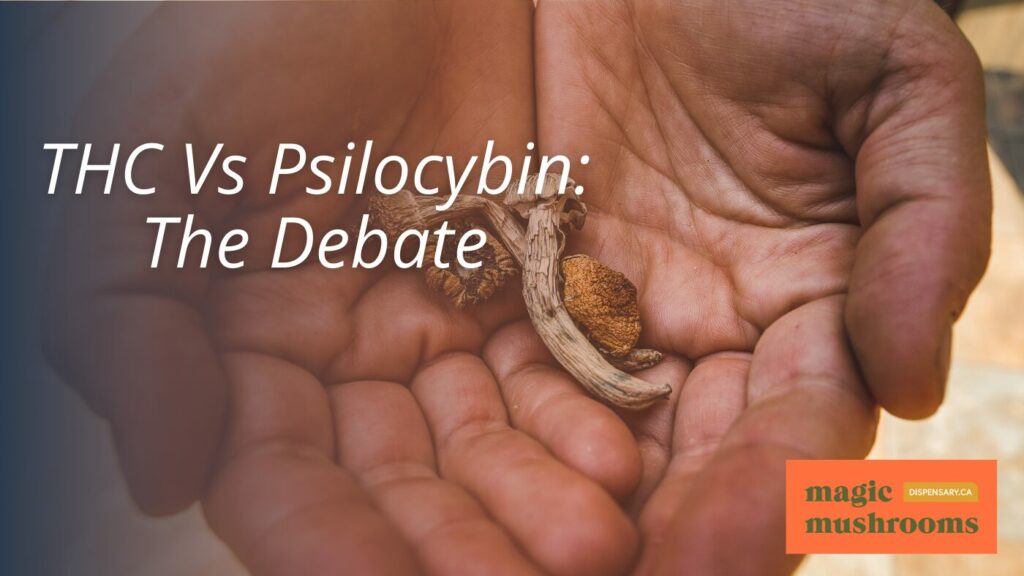
The debate concerning THC and psilocybin centers on their distinct effects, potential risks, and therapeutic benefits, requiring individuals to consider their personal needs and goals carefully. THC, the psychoactive component of cannabis, delivers a calming, euphoric experience and is often used for pain relief and relaxation. On the other hand, psilocybin, found in magic mushrooms, offers profound, perception-altering experiences and is gaining recognition for its potential in treating mental health disorders.
THC’s interaction with the body’s endocannabinoid system can affect mood, appetite, and memory, often resulting in temporary memory impairment and coordination issues. Contrarily, psilocybin binds to serotonin receptors, inducing intense visual and sensory experiences, which can lead to deep emotional introspection and spiritual insights.
While THC is widely used for recreational purposes and pain management, psilocybin’s potential as a therapeutic agent for mental health conditions like depression and anxiety is currently under investigation. However, it’s important to note that both substances can pose potential risks and side effects, necessitating a careful consideration of one’s health status, tolerance, and personal objectives.
Choosing between THC and psilocybin ultimately comes down to individual preferences and desired effects. If you seek relaxation and euphoria, THC may be your fit. If your aim is introspection and potentially transformative experiences, psilocybin might be worth exploring. Consulting with healthcare professionals and staying updated with the latest research are essential to making an informed decision. As you navigate this terrain, remember that knowledge and prudence should always guide your quest for liberation.
User Experiences: THC
As we explore user experiences with THC, it becomes evident that this psychoactive compound in cannabis can induce a spectrum of effects ranging from relaxation and euphoria to increased sensory perception. Many users report feeling a sense of calm and happiness, a phenomenon often accompanied by heightened awareness of sounds, colors, and tastes. This increased sensory perception can make ordinary experiences feel extraordinary, usually leading to a deep appreciation for music, art, and nature.
Furthermore, THC can also induce physiological effects, including dry mouth and an increased appetite, commonly referred to as ‘the munchies.’ This can be beneficial for individuals struggling with conditions causing loss of appetite, such as chemotherapy-induced nausea or certain forms of anorexia.
However, it’s noteworthy that the effects of THC are not uniformly positive. They can vary based on dosage, strain, and individual tolerance levels. For some users, particularly those who consume high doses or potent strains, experiences with THC may include anxiety, paranoia, and impaired cognitive function.
Despite these potential drawbacks, scientific research has highlighted the therapeutic potential of THC, especially in pain management and appetite stimulation. For individuals considering the use of THC, it is essential to approach it with an open mind, armed with knowledge and a deep understanding of their own needs and reactions. After all, the journey toward liberation is not a one-size-fits-all path but a profoundly personal exploration of self and substance.
User Experiences: Psilocybin
Shifting our focus to psilocybin, the active compound in magic mushrooms, it’s worth noting that this substance can induce profound alterations in sensory perception and consciousness. The effects of psilocybin are often described as immersive, transcending the boundaries of ordinary reality and plunging users into a world of vibrant colors, distorted shapes, and altered time perception.
People who have experienced psilocybin report a broad spectrum of effects, from feelings of euphoria, wonder, and deep connectedness to more challenging experiences characterized by intense anxiety and muscle twitching. These reactions, however, are deeply personal and can be influenced by factors such as dosage, mindset, and environment.
A typical psilocybin experience lasts 4 to 6 hours. Users often report enhanced creativity, profound introspection, and spiritual insights during this time. These experiences can be transformative, leading to long-lasting personality, attitudes, and values changes.
Moreover, psilocybin is showing promise in the field of mental health. Some individuals find psilocybin experiences therapeutic, helping them face and process difficult emotions, thereby alleviating symptoms of mental health conditions like depression and anxiety.
However, it’s imperative to approach psilocybin with respect and caution. Responsible use, including careful dosage, a positive mindset, and a safe and comfortable environment (the ‘set and setting’), are essential for a positive and safe psilocybin experience. As with any psychoactive substance, consulting with healthcare professionals and staying informed on the latest research can help individuals make informed decisions about their use.
Frequently Asked Questions
Can THC and Psilocybin Be Used in Combination for Therapeutic Purposes?
Current research on combining THC and psilocybin for therapeutic purposes is limited. Both substances have individual therapeutic potentials; THC is beneficial for pain management, while psilocybin is promising in mental health treatment. However, the interaction between the two and their combined effects must be better understood. To ensure safety and effectiveness, consulting with healthcare professionals before combining these substances is essential. Further research is required to explore this combination’s potential benefits and risks.
What Are the Withdrawal Symptoms After Discontinuing THC or Psilocybin Use?
Withdrawal symptoms after discontinuing THC may include irritability, insomnia, and loss of appetite. Psilocybin, on the other hand, doesn’t typically cause physical withdrawal symptoms, but discontinuation may trigger psychological effects such as anxiety or depression. Always consult with a healthcare professional before changing or stopping any psychoactive substance use to guarantee a safe and supported process.
Is There an Age Limit or Restriction for Using THC or Psilocybin?
Both THC and psilocybin use are generally restricted to individuals above the age of 21 in regions where they are legally available. This is due to concerns about potential impacts on brain development in younger individuals. However, specific age restrictions can vary depending on local laws and regulations. Always consult local legislation and healthcare professionals to guarantee these substances’ safe and legal use.
How Do THC and Psilocybin Interact With Other Medications or Substances?
THC and psilocybin can interact with other medications or substances, potentially leading to adverse effects. THC can amplify the effects of alcohol and sedatives and may interact with drugs like blood thinners. Psilocybin may interact with antidepressants, leading to a condition called serotonin syndrome. Individuals need to discuss potential interactions with their healthcare provider before combining these substances with other medications.
Are There Any Specific Diets or Foods That Can Enhance or Reduce the Effects of THC or Psilocybin?
Diet can indeed influence the effects of both THC and psilocybin. Fatty foods can enhance THC absorption, while fasting may intensify psilocybin’s effects. However, specific dietary interactions can vary from individual to individual. Additionally, certain substances like alcohol or caffeine may alter these effects. Always consult with a healthcare professional for personalized advice on dietary practices when using these substances to guarantee safety and efficacy.
Conclusion
Ultimately, the choice between THC and psilocybin, both potent substances with distinct effects, hinges on their unique therapeutic benefits. This comparison, often referred to as THC vs Psilocybin, is necessary to consider these benefits against potential risks when contemplating usage. Decisions should be grounded on scientific research and professional medical advice. As our comprehension of these substances expands, the potential for their practical and safe application in treating various conditions continues to grow. The choice in the THC vs Psilocybin debate should ultimately be dictated by individual needs, preferences, and the counsel of healthcare professionals.
Buying Microdosing Mushrooms Online in Canada
Are you an avid microdoser or looking to venture into the art of microdosing? Working with a reliable, trustworthy shrooms dispensary is paramount in becoming a better version of yourself. Magic Mushroom Dispensary prides itself on its comprehensive collection of top-notch microdosing products, psilocybin books, excellent customer service, and fast, discreet shipping. Visit our online shop today and enjoy low prices and free shipping for orders above $99.
Originally posted on June 30, 2024 @ 9:56 am
